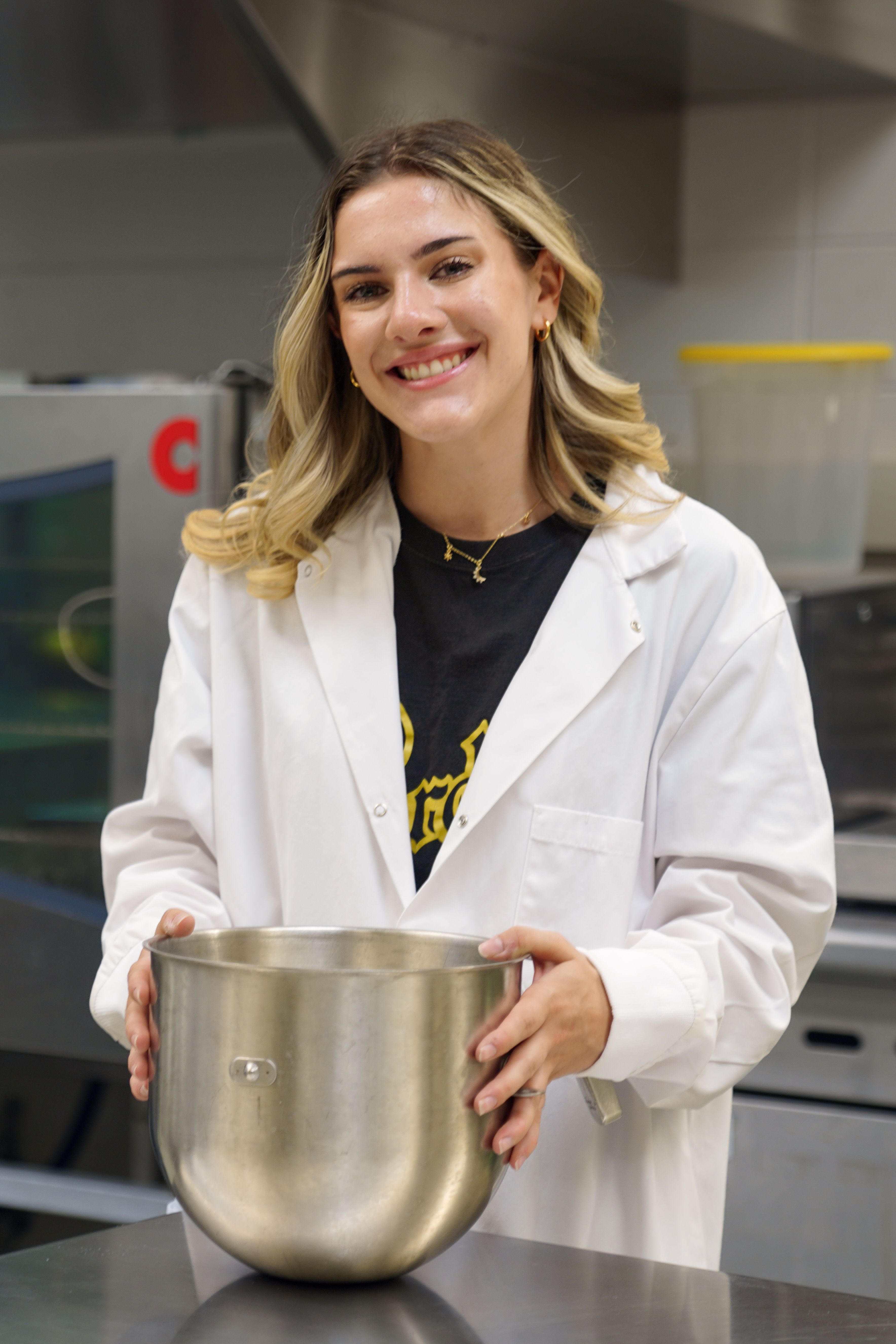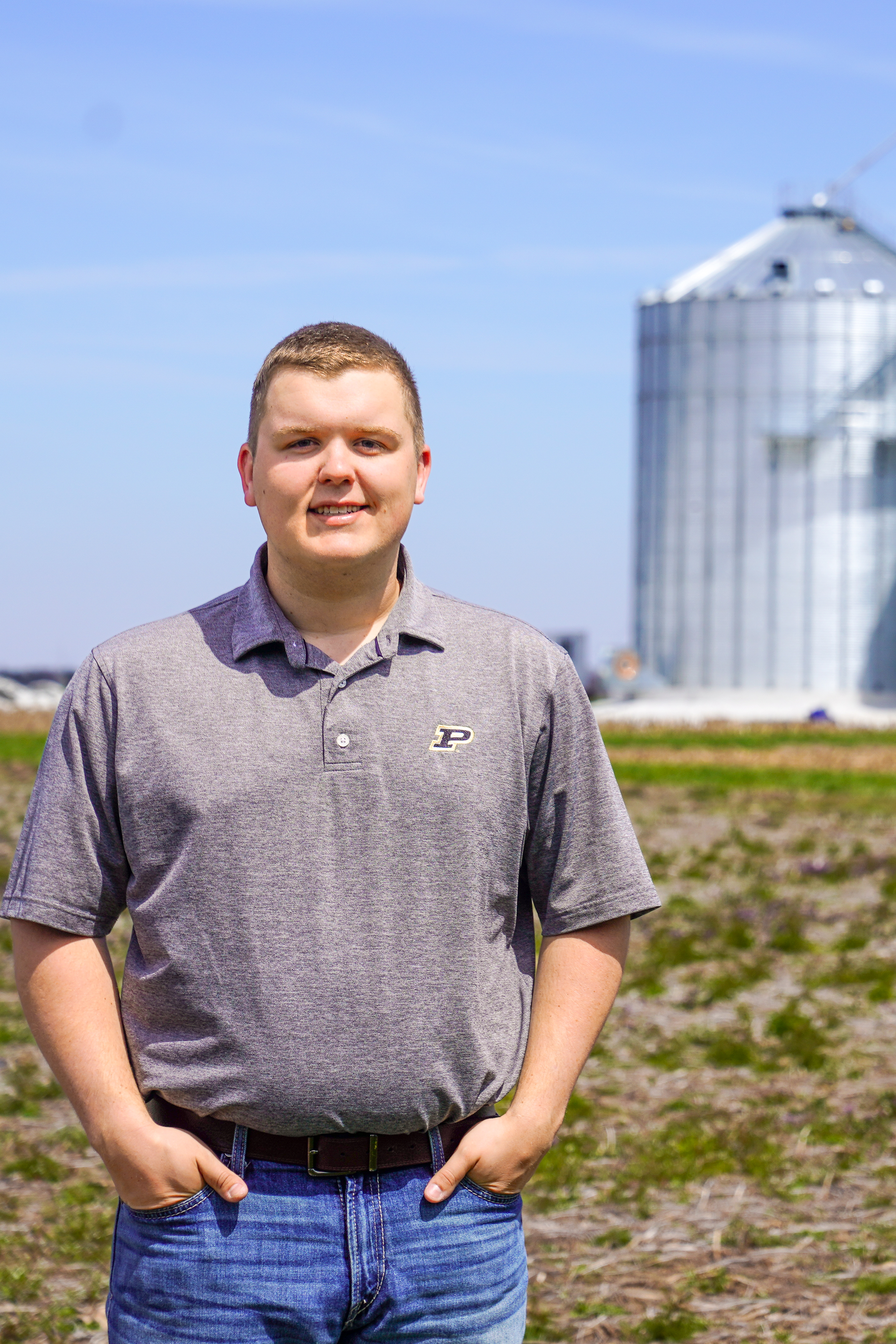Purdue Agriculture graduates take their next giant leap
As students prepare to don their caps and cross the stage, learn how Purdue Agriculture’s graduating seniors represent the future of agriculture.
JEREMIAH GEISE
Major: Animal sciences / Concentration: Production and industry
Fall 2021-Spring 2025
SMALL STEPS
Growing up, my family had a sheep flock, and I fell in love with the natural color lambs, which are a dark black color. Then when we got goats (after begging my dad), I was exposed to the whole color palette–redheads, dapples, paints, capes, all of it! As a 12-year-old, I wanted to understand what caused the goats’ different colors . And as I got older, since I had personally invested in our goat operation, I thought, “How can we make breeding decisions to make super productive animals?” I was passionate about figuring out how I could tie cool colors and good production traits together.
I always knew that I would go for a higher education after my bachelor’s, and for a while I thought that would be vet school. But after working with professor Hinayah Rojas de Oliveira, assistant professor of genomics and animal breeding, I realized I was really interested in a master’s in animal breeding and genetics. It’s such an underrepresented field, but there’s so much research that can come out of it, and we can develop a deeper understanding about things. Once I felt that spark and passion again, I knew that pursuing graduate studies and genetics was the path for me.
 MY NEXT GIANT LEAP
MY NEXT GIANT LEAP
I’m really excited to start my journey through graduate school. I’m not sure what my research will be yet, but there are so many up-and-coming fields and cool projects on the horizon.
We see a lot of research on swine and cattle genetics, but I’m more interested in small ruminants, like sheep and goats. Small ruminants in the U.S. are interesting because it’s an underdeveloped industry, and there isn’t much funding right now. However, there’s some really cool research happening overseas, and I’m keeping tabs on that to see how it affects producers and how I could possibly apply that here, to help connect producers in the United States.
THE FUTURE OF ANIMAL SCIENCES
I’m currently working with AgriNovus’ Velocity start- up program, and originally my start-up was going to be a large-scale goat operation in the Midwest, accelerating goat genetics. Looking at breeding and genetics creates more profitable operations for farmers and improved health and welfare of the animal. But I quickly learned the resources I wanted did not exist. With cattle, for example, we have genomic testing that lets us find specific genetic traits, allowing us to breed animals with the best genetic correlation and manage these animals to their highest potential. There isn’t anything like this for small ruminants, so I decided to create my own genomic test as my start- up program.
This research and research like it can change our perspective of how small ruminants function in agriculture, especially in North America. Here, we don’t see a lot of interconnections between small ruminant producers, large-scale operations or as many resources for farmers like cattle or swine producers. There’s a disconnect between large and small producers. Connecting the two through research can give small farmers access to a wealth of knowledge and significantly help them standardize products for the market.
LOOKING AHEAD
I’m interested to see how we can use genetics to push agriculture forward. Whether it’s with plants or animals, we can create super sustainable agricultural systems based on genetics management. I’m currently in conversations with producers who want to push the envelope of agriculture to show that there is a want for technology like a genomic test for goats, it just doesn’t exist yet. No one else is doing it, so why not me? I can’t wait to contribute to the science, the industry, the research, no matter what capacity it is.
EMELIA ASHBY
Major: Food Science / Minor: Spanish
Fall 2021-Spring 2025
SMALL STEPS
I got into food science because I’ve always loved food. It’s a cliché answer, but it’s how I learned about the world growing up! I grew up in a rural, small community, and there wasn’t a lot of outside cultural influence. So, one of the ways my mom would teach us about different cultures was to cook us meals from all around the world. That’s how I started appreciating food, and I see it as an adventure, trying new things. It’s a powerful tool to connect with people, because everybody’s got to eat. Connecting with others is important to me. I also always enjoyed the sciences in high school, so it was a no-brainer to marry those two passions of mine!
When I studied at Purdue, it was clear to me I couldn’t have chosen a better career path than food science. I also continued my language learning by minoring in Spanish, and I had great Spanish professors who pushed me out of my comfort zone. I am a student contributor to the Food Entrepreneurship and Manufacturing Institute, which has taught me valuable lessons about working on a team. All of these experiences led to where I want to go next, and I hope I can use these experiences to help others succeed.
 MY NEXT GIANT LEAP
MY NEXT GIANT LEAP
After graduation, I’ll go on to work for Lactalis, a dairy operation based in France. I chose Lactalis because throughout the interview process, it was evident that they are committed to investing in the next generation of food scientists. I was one of five students nationwide selected to represent my company abroad, and this aligned with my commitment to furthering my education and living globally. Lactalis sponsors a program called I2FA in which I’ll go to grad school for two years in France to study agricultural engineering. At the same time, I’ll be getting real-world experience in their dairy factories. I’ll also be learning French! I feel like I’m continuing what always interested me in food–how science and culture are intertwined.
THE FUTURE OF FOOD SCIENCE
After I get my degree, I’ll take all this knowledge and cultural skills back to the United States. Lactalis has placed me in Casa Grande, Arizona, in a mid-tier management role. I’m excited to see how I’ll like being in a leadership position. I’ll bring a unique experience to the table, having that experience living, working and studying abroad, and seeing how different cultures structure leadership will help me become an innovative and creative leader.
My biggest strength that will help me be a leader in agriculture will be being able to speak to people in their native language. There’s a huge French influence at Lactalis, and many working at their Casa Grande location speak Spanish. Food is perhaps the most global industry. Our common denominator is food, and however that ties into culture is significant. I think what makes me shine is being able to connect with people on a deeper level, whether that be through culture, food or language, and that’s going to change the industry for the better. Learning food science and a new language throughout college prepared me for my future.
LOOKING AHEAD
What am I most excited for? It’ll be a little scary, moving abroad, but there are so many possibilities! Going into the unknown is exciting for me.
RYAN LIEBERMANN
Major: Agricultural systems management / Minors: Organizational leadership and food and agribusiness management
Fall 2021-Spring 2025
SMALL STEPS
Growing up, I worked for my best friend’s family farm, and this sparked an intertest in all things agriculture. I always wanted to be a Boilermaker, and I wanted the hands-on experience and interaction with farmers that Purdue provides.
Ag systems management takes this hands-on approach to agriculture, which I enjoy. It focuses on the machine systems and technology that powers agriculture, which means I’m working alongside ag engineers to solve problems, being innovative and never stop improving what’s already been made.
I think what’s most meaningful to me is looking at what’s already been done and seeing how we can improve it. For example, in class, we did a lot with grain testing, seeing how grain should be properly stored and how you can improve safety in agriculture. I care about people, which is why I am going into sales. It's cool to see how innovations can combat dangers to our farmers like grain dust explosions and impact real people in a positive, tangible way.
 MY NEXT GIANT LEAP
MY NEXT GIANT LEAP
I interned with a company called SweetWater Technologies for two summers. After graduation, I’ll be their Indiana sales representative, working with farmers to be their trusted agronomic advisor and ensure they are getting the products and services that they deserve. I’ll also be working with other drone application companies, ensuring they are also giving their customers cutting edge products. There are really no limits to what you can do at Sweetwater–we’re encouraged to take the initiative and be creative.
I love building relationships, so sales is the perfect mix of my passion for helping others and science and technology. When I go to a farmer and promise a service, I want to be able to deliver and make it stress-free. Farmers are under enough stress already, whether it’s the weather or the grain market. I want to be that trusted source for farmers, to improve mental health in that field and not have to worry about making the wrong agronomic decision. SweetWater Technologies is well on their way to making a big difference in the agricultural industry.
THE FUTURE OF AGRICULTURAL ENGINEERING
Drones are on the horizon for being one of the most influential technological impacts on the farming industry over the last few years. Farmers and agricultural professionals are constantly looking for environmentally safer, more precise ways to apply chemicals to their fields, especially in suburban areas, and drones can do this well. It’s a good alternative for farmers because it doesn’t cost as much as a plane or helicopter. More precise technology and delivery systems may also mean less chemicals need to be used, preventing chemicals from ending up where they aren’t supposed to be.
LOOKING AHEAD
People my age, we’re always using technology. It’s everywhere. We’ve been raised with it, and it’s evolved so drastically over the last 20 years. I think that’s amazing, and it’s always changing! Who knows what we could do over the next 20 years? I’m a life-long learner, and I want to stay on the cutting-edge of drone technology. You can never learn too much, and I want to be a part of that change for the better.





